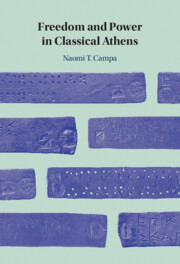Book contents
- Freedom and Power in Classical Athens
- Freedom and Power in Classical Athens
- Copyright page
- Dedication
- Contents
- Acknowledgments
- Conventions and Abbreviations
- Chapter 1 Introduction
- Chapter 2 Democratic Eleutheria as Positive Freedom
- Chapter 3 Oratorical Ambiguity
- Chapter 4 Power and the Citizen
- Chapter 5 The Powerless and Unfree
- Chapter 6 Conclusion
- Bibliography
- Index Locorum
- General Index
Chapter 4 - Power and the Citizen
Published online by Cambridge University Press: 04 April 2024
- Freedom and Power in Classical Athens
- Freedom and Power in Classical Athens
- Copyright page
- Dedication
- Contents
- Acknowledgments
- Conventions and Abbreviations
- Chapter 1 Introduction
- Chapter 2 Democratic Eleutheria as Positive Freedom
- Chapter 3 Oratorical Ambiguity
- Chapter 4 Power and the Citizen
- Chapter 5 The Powerless and Unfree
- Chapter 6 Conclusion
- Bibliography
- Index Locorum
- General Index
Summary
In Chapter 4, I offer a new theory of citizen power. Every adult male citizen would have been free, but this also made him kurios, or empowered, as opposed to ceding his power to a slave master. When substantivized, kurios indicated a male citizen’s institutionalized role as the head of a household. The lens of the household kurios generates an understanding of citizen power that encompasses both private and public domains. Not simply power as domination, kurios also indicated a shared power to act. As a conceptual metaphor, kurios was applied to the political sphere and structured thought across these different domains. Thus, qualities of the term kurios in its original domain, the household, corresponded systemically in the applied domain, the city. The laws and the corporate citizen body, too, were understood as kurioi. While there may be competing claims to power, the identification of the citizen as sharing in power with and through the laws and the dēmos is distinct from the modern conception of the individual versus the state. The negotiation of power in this way has repercussions for debates regarding sovereignty and the rule of law.
Keywords
- Type
- Chapter
- Information
- Freedom and Power in Classical Athens , pp. 88 - 135Publisher: Cambridge University PressPrint publication year: 2024

